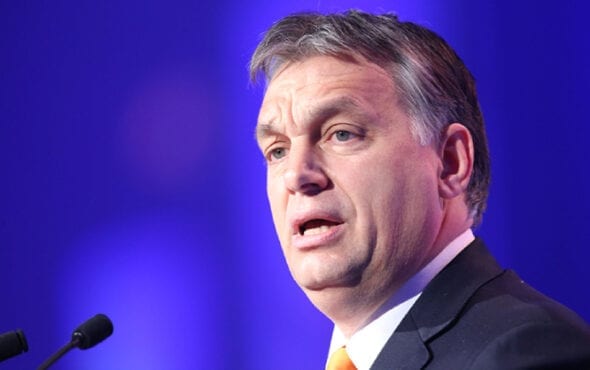
Hungarian Prime Minister Viktor Orbán has announced his government will hold a referendum on the country’s widely controversial anti-LGBTQ+ law.
On Wednesday (July 21), the prime minister of Hungary stated the upcoming referendum is on “child protection”, which alludes to the discriminatory law which has been passed.
The law bans portrayals of LGBTQ+ content in schools through amendments that were made to a national child sex abuse law. It strictly refers to “content promoting gender change or homosexuality” within the school curriculum.
“LGBTQ+ activists visit kindergartens and schools and conduct sexual education classes. They want to do this here in Hungary as well,” Orban stated in a Facebook video on Wednesday.
The referendum, which was announced three days before the Budapest Pride march, will consist of five pre-prepared questions.
The Guardian published one of the questions that will be included: “Do you support minors being shown, without any restriction, media content of a sexual nature that is capable of influencing their development?”
Hungary’s law has widely been compared to Russia’s “gay propaganda” law, which was passed in 2013, which bans disseminating “propaganda on nontraditional sexual relations” among Russians.
Orbán’s anti-LGBTQ+ rhetoric has been a key strategy to appeal to right-wing supporters and conservative voters. However, Orbán’s comments have not been without backlash.
On July 8, the European Parliament has passed a parliamentary resolution and rejected Hungary’s new discriminatory law in the “strongest possible terms”.
459 Members of the European Parliament (MEPs) voted in favour of the resolution, with 147 against and 58 abstaining in Strasbourg
MEPs called the Hungarian law “a clear breach of the EU’s values, principles and law” and urged the European Commission to pursue a legal case against Viktor Orbán’s government.
Lawmakers in Hungary passed legislation on Tuesday (15 June) banning “content promoting gender change or homosexuality” within the school curriculum.
In a statement, European lawmakers called “on the Commission to launch an accelerated infringement procedure and to use all tools in the Court of Justice, such as interim measures and penalties for non-compliance if necessary.
They also call on the member states to bring the matter to the CJEU (Court of Justice of the European Union) should the Commission not act, and to launch an inter-state application to the European Court of Human Rights.”
Ursula Von der Leyen directly condemned Hungary’s anti-LGBTQ+ legislation: “This law puts homosexuality and gender reassignment on a par with pornography,” Von der Leyen said on Wednesday.
“This law uses the protection of children, to which we are all committed, as an excuse to severely discriminate against people because of their sexual orientation. This law is disgraceful.”
The ruling was passed by 157 votes to just one in the National Assembly, despite leading human rights officials and activists in Europe criticising the bill as “an affront against the rights and identities of LGBTI persons”.
The national-conservative Fidesz party were joined by the right-wing Jobbik party in overwhelmingly voting in favour of the new measure, while an independent lawmaker voted against it.
The European executive is now preparing a warning letter to be sent to Orbán, which would mark the first step in the process to modify or repeal the anti-LGBTQ+ legislation.
The case could be brought before the European Court of Justice and Hungary could potentially face financial penalties.
Orbán continues to claim that the anti-LGBTQ+ law has been put in place to protect children, but activists have rightly pointed out that this dangerous way of thinking continues to conflate paedophilia with homosexuality.
“The European Parliament and the European Commission want that we let LGBTQ activists and organisations into the kindergartens and schools. Hungary does not want that,” Orbán said previously. “Here Brussels bureaucrats have no business at all.”



